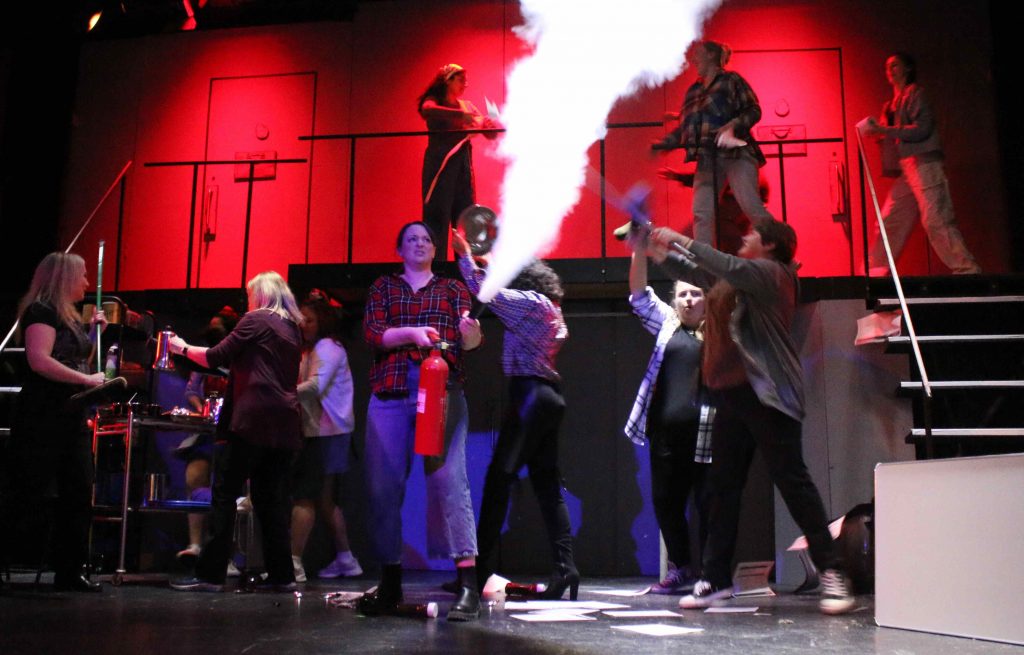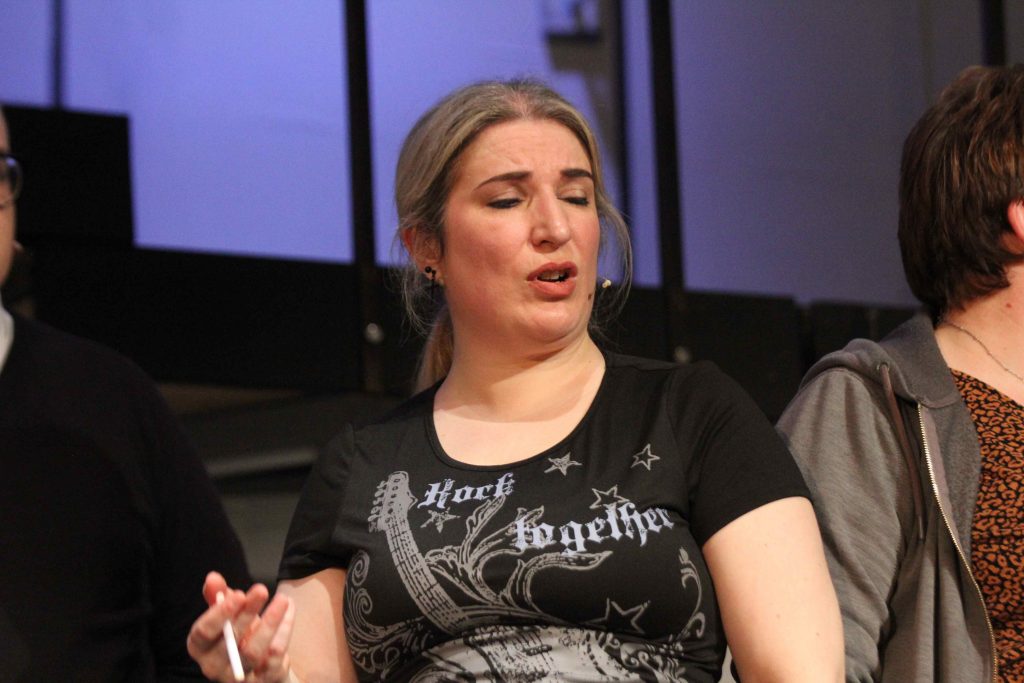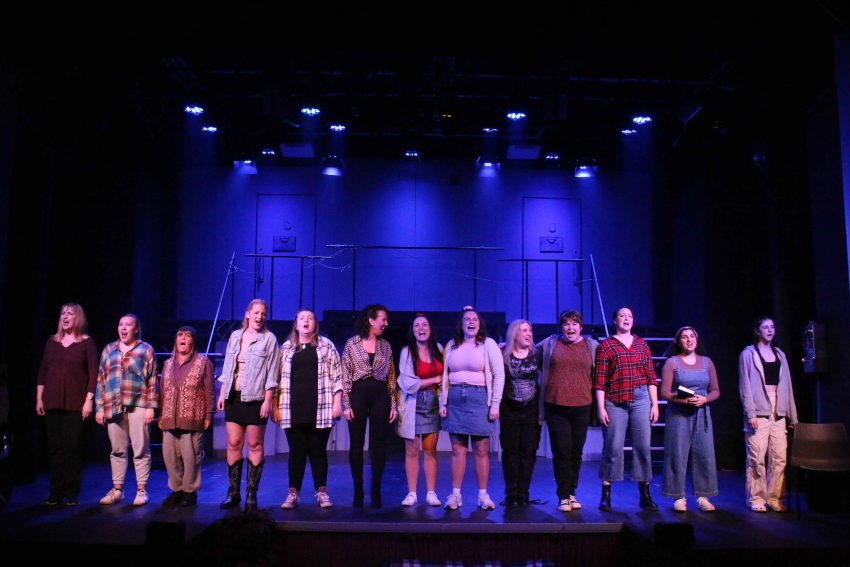I love performing in musical theatre. It’s my happy place. I adore being in musicals. And yet plays? Not my bag. So what makes musical theatre different? Is it even different from being in a play?
So here’s the deal. I do like watching plays at the theatre. When I’m watching a play, I’m all in—clutching my pearls and riding the emotional rollercoaster with the best of them. But when it comes to being on stage, if there’s no song and dance, count me out! Musical theatre isn’t just a performance; it’s an emotional experience! It’s where I can truly shine — not just act, but sing, dance, and enjoy myself!
Why musicals bring out my emotional side
I first realised the emotional impact of musical performance when I played the role of July in Annie. I was only 11 years old and it was my first endeavour into the world of musical theatre. I remember that amazing feeling of hearing that opening number, the excitement of sitting on the stage bed, and hearing my friend sing the beautiful song “Maybe”. It was at that moment I realised this was where I belonged.
I kept performing in musicals up until I turned 16. Sadly my reckless teenage brain decided that partying and men were more important. And then life got in the way; university, children, marriage, and work all took over. Until just after I turned 41 and I decided to get back on stage.
Learning to get back on stage
My first musical after my 25-year hiatus was the prison-based musical Bad Girls. This was a great welcome back to musical theatre as it’s a fun and somewhat “messy” musical. And the epitome of this chaotic musical was the prison riot number “That’s the Way it is”. Despite being a number with minimal choreography, it relied on emotional movement and sound. The prisoners have had enough and want to fight back. Coordinating the movement required to fight one of the prison officers (who was a fantastic scrapping partner) with a weapon (a broom), whilst simultaneously singing a mezzo-soprano harmony, was a huge challenge. And the end result was brilliant. On closing night, the props team told us we could go all out. So by the end of the scene, the stage was a mess of loo roll, cakes, toast, papers, and weapons. It was an intensity I’d never experienced before and I loved it.

The costume makes the musical magical
This week we got measured for our Hot Mikado costumes. Oh did that bring back memories! One particular musical that came to mind was The Boyfriend. I played Dulcie the young girl who was dating a French bachelor, yet decided to have a dalliance with a much older gentleman. The musical is set in the 1920s, so we had wonderful flapper dresses. Getting into those costumes really took me to the decade and I completely embraced my character. I’m certain that the 40s lindy-hop inspired dressed in Hot Mikado will do the same, but to date, no costume has ever engaged me like the fabulous fashions of The Boyfriend.
What makes musical theatre different from plays?
I think musical theatre just has a nicer pace to it. It’s lighter in tone. Plays are fantastic to watch, but performing in them is just simply not as fun. You learn your lines, find your character and you go. But a musical – well you’re embracing the songs, expressing yourself through dance, and truly feeling your role. And of course, in musicals, you have the ensemble – a way to be part of the cast without having a role. In Bad Girls I was speaking ensemble, which allowed me to take a soft step back into performing without the pressure of having to learn a huge number of lines. In Hot Mikado, I’m the female lead, so I have a lot of work. Our next show is Evita, in which I will go back to the ensemble to take a break, whilst still getting the chance to perform. Plays don’t usually allow that flexibility.
How I prepare for a role in musical theatre
I see musical theatre preparation as a three-phase process.
- Phase 1: Familiarity
In phase one I learn about the musical and the roles. This helps me determine whether I want to audition for a principal role (whether lead or supporting). I listen to the soundtrack (most are on Spotify) and see which vocal tracks suit my voice. I then look at the script to see if the character suits me. I do this a couple of months before our intro night (when we’re given details on the musical) as I like to be prepared. I’ll also watch either a film of the musical or a recorded performance on YouTube. This helps me to decide whether I want to go for a role or stay in ensemble. Other factors that go into that decision include my schedule, whether I recently took a role, and my workload. - Phase 2: Audition prep/Ensemble prep
In phase two I’ll focus on preparing either to audition or rehearse. If I’m auditioning I’ll share my audition songs with my singing coach (Hanna at Tutorful – she’s fabulous). We’ll go through the piece and work on it until it’s perfect. I’ll also rehearse any spoken lines both alone and at audition prep sessions held by the society. Finally, I’ll choreograph any movement I wish to include. I commit to this during this period and it can be a nightmare at home. But it’s worth it to go into auditions confident and prepared. The night before auditions I’ll have a low-key evening and early night.
When I’m just doing ensemble prep it’s more straightforward. I listen to the songs and read through the lyrics. Then I use an app called Harmony Helper to pull out the mezzo-soprano notes to get a handle on them before rehearsals. It’s a lot easier, but still an important preparation piece. - Phase 3: Rehearse, rehearse, rehearse
During the rehearsal phase, I’ll ensure I attend every session I’m free. Which means if I’m not on holiday or sick I’m there. I also continue to listen to the soundtrack as well as any recordings of the vocal notes provided. If I’m a principal I’ll read the script every evening and I use a script rehearsal app to practice my lines. I take notes from the director, choreographer, and MD and reflect on them. And any choreography videos get viewed at home so I can practice my steps. Obviously, the amount of work depends on my role, but the goal is to step on that stage confident and ready.
My Grandparents were my biggest fans
Bad Girls the Musical was my first performance that my grandparents didn’t attend. Sadly both passed away in the last 5 years. But in my childhood and teens, they attended every show. When my grandmother passed away and my grandfather got dementia, we found a file with every program from my performances. They used to love seeing my shows and my only regret is not returning to musical theatre sooner so they could see more. However, I like to think they watch me from heaven and chuckle at all the naughty jokes!

My biggest creative challenge was a hideaway
In my late teens, I played the role of Gladys in The Pyjama Game. It was a great role, but with it came one of the most challenging musical numbers I’ve experienced – Hernando’s Hideaway. It’s an alto song with a very unique melody. And whilst not particularly fast or at a stretching pitch, it was a tough nut to crack. Thankfully I had a great MD who pushed me hard to get the melody. This experience has helped me prepare for the tricky songs in Hot Mikado. My singing coach at Tutorful gets me to take small sections of tricky songs at a time. I repeat short snippets of songs on repeat until I get them right. And when I finally performed Hernando’s Hideaway I had so much fun.
My most iconic role to date
In the late 90s, I was fortunate to get the role of Sally Bowles in Cabaret. Playing Liza Minelli’s iconic role was amazing and I loved every minute. It’s one of a few roles I’d love to reprise because it’s everything I love in a character; raw sexuality, vulnerability, and strength. When playing a legacy role it’s important not to mimic the icon who is remembered for the piece. I deliberately moved away from the Liza version and gave the role a more feminine and coy feel. If I were to reprise the role, I’d go further and introduce a darker, damaged side to the role. Playing a legacy role is fun (and believe me if I wasn’t coming out of a principal role I’d be auditioning for Eva Peron) but it’s so important to avoid replicating the well-known portrayal.
Musical theatre has been life-changing for me for many reasons. In my teens, it gave me a creative outlet that prevented my adolescence from being a disaster. However, in my forties, it made a significant change to my confidence and helped me manage PTSD. I certainly recommend musical theatre as an outlet for anyone looking to improve their mental health and wellbeing. Keep following my blog to learn more about musical theatre and if you’re in the Derbyshire area book your tickets to see me at The Duchess Theatre in October. I’m in Hot Mikado playing the role of Yum-Yum.
